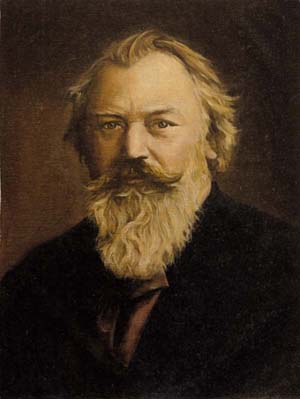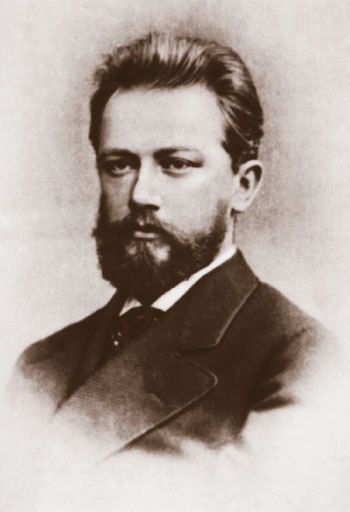This Week in Classical Music: May 5, 2025. Double birthday, Sofronitsky. May 7th is in two days, adate that creates a yearly conundrum: the birthday of two great composers, Johannes Brahms and Peter Tchaikovsky. Only seven years separate them (Brahms was born in 1833, Tchaikovsky in 1840), both had worked with the “large form”: symphonies, concertos, but musically, they are very different. Brahms worked under the influence and in the tradition of Beethoven, while Tchaikovsky attempted to create a new national musical style. In some of our posts we had tried to address their similarities (both wrote some of the best violin and piano concertos in the classical repertory, their symphonies are momentous, etc.), other times we tried to accentuate the numerous differences; we wrote about one composer and then another. None of it worked too well. We even noted that both wrote some music quite popular with the public, that we dislike strongly (more of it, in fact, than other composers of their stature): Tchaikovsky in his ballets, Brahms in his Hungarian-themed pieces. So today we’ll abandon our efforts and turn to other musicians who have their anniversaries this week.
An important Russian pianist, Vladimir Sofronitsky, was born on May 8th of 1901, in St. Petersburg. Sofronitsky, one of the greatest interpreters of the music of Scriabin, was married to the composer’s eldest daughter (they married in 1920, five years after Scriabin’s death). The Sofronitskys temporarily moved to Warsaw in 1903, where Vladimir started his piano lessons. In 1913, the family returned to St. Petersburg, and in 1916, Vladimir entered the conservatory, where his classmates were Dmitry Shostakovich and the pianist Maria Yudina. In 1928, Sofronitsky went to Paris, where he met and befriended two recent émigré composers, Sergei Prokofiev and Nikolai Medtner. In 1930, he was invited to teach at the Leningrad (former St. Petersburg) conservatory. He was living in the city during the catastrophic WWII blockade, when more than 600,000 Leningraders died of starvation. Sofronitsky was evacuated in April of 1942 and brought to Moscow, where he lived for the rest of his life. For many years, he taught at the Moscow Conservatory. In addition to Scriabin, Sofronitsky was known for his interpretation of the music of Chopin, Schubert and Schumann. His technique was far from perfect (in that he reminds us of Alfred Cortot), but his musicianship was impeccable. Sofronitsky died in Moscow in 1961. Here’s his recording of Scriabin’s breakthrough Sonata no. 3. There is some confusion as to when this recording was made; we believe it’s a later one, a studio recording from 1961, the year of Sofronitsky’s death.
Two prominent conductors were also born this week: Jascha Horenstein, on May 6th of 1898 in Kiev, the Russian Empire, and Carlo Maria Giulini, on May 9th of 1914. Horenstein studied in Vienna and worked as an assistant to Wilhelm Furtwängler. He moved to the US in 1940. Horenstein was an early champion of the music of Gustav Mahler; he also conducted many composers of the 20th century. Giulini was born in a small coastal town of Barletta, Apulia, famous for the 5th century bronze statue, Colossus of Barletta. Giulini studied at the Conservatorio Santa Cecilia in Rome and later played the violin in the Orchestra of the Academy of Santa Cecilia, where he worked with some of the best conductors. He started conducting late, partly because during the war he was drafted into Mussolini’s army (a pacifist, he claimed not to have shot a single person). From 1944, his conducting career flourished. He started at the radio orchestras of RAI, the Italian radio corporation, then worked at the Bergamo opera, where he led performances of La Traviata with Maria Callas and Renata Tebaldi alternating the role of Violetta (what a treat that was!). He was noticed by Toscanini and Victor de Sabata, whom he replaced in 1953 as the music director of La Scala. The following five years, with Giulini at the helm, were some of the greatest in the history of the theater. He went on to conduct major orchestras in Europe and the US, including the Chicago Symphony and Vienna Philharmonic. Giulini lived to the age of 91 and died in 2005.
Double birthday, Sofronitsky, 2025
This Week in Classical Music: May 5, 2025. Double birthday, Sofronitsky. May 7th is in two days, adate that creates a yearly conundrum: the birthday of two great composers, Johannes Brahms and Peter Tchaikovsky. Only seven years separate them (Brahms was born in 1833, Tchaikovsky in 1840), both had worked with the “large form”: symphonies, concertos, but musically, they are very different. Brahms worked under the influence and in the tradition of Beethoven, while Tchaikovsky attempted to create a new national musical style. In some of our posts we had tried to address their similarities (both wrote some of the best violin and piano concertos in the classical repertory, their symphonies are momentous, etc.), other times we tried to accentuate the numerous differences; we wrote about one composer and then another.
Brahms and Peter Tchaikovsky. Only seven years separate them (Brahms was born in 1833, Tchaikovsky in 1840), both had worked with the “large form”: symphonies, concertos, but musically, they are very different. Brahms worked under the influence and in the tradition of Beethoven, while Tchaikovsky attempted to create a new national musical style. In some of our posts we had tried to address their similarities (both wrote some of the best violin and piano concertos in the classical repertory, their symphonies are momentous, etc.), other times we tried to accentuate the numerous differences; we wrote about one composer and then another.  None of it worked too well. We even noted that both wrote some music quite popular with the public, that we dislike strongly (more of it, in fact, than other composers of their stature): Tchaikovsky in his ballets, Brahms in his Hungarian-themed pieces. So today we’ll abandon our efforts and turn to other musicians who have their anniversaries this week.
None of it worked too well. We even noted that both wrote some music quite popular with the public, that we dislike strongly (more of it, in fact, than other composers of their stature): Tchaikovsky in his ballets, Brahms in his Hungarian-themed pieces. So today we’ll abandon our efforts and turn to other musicians who have their anniversaries this week.
An important Russian pianist, Vladimir Sofronitsky, was born on May 8th of 1901, in St. Petersburg. Sofronitsky, one of the greatest interpreters of the music of Scriabin, was married to the composer’s eldest daughter (they married in 1920, five years after Scriabin’s death). The Sofronitskys temporarily moved to Warsaw in 1903, where Vladimir started his piano lessons. In 1913, the family returned to St. Petersburg, and in 1916, Vladimir entered the conservatory, where his classmates were Dmitry Shostakovich and the pianist Maria Yudina. In 1928, Sofronitsky went to Paris, where he met and befriended two recent émigré composers, Sergei Prokofiev and Nikolai Medtner. In 1930, he was invited to teach at the Leningrad (former St. Petersburg) conservatory. He was living in the city during the catastrophic WWII blockade, when more than 600,000 Leningraders died of starvation. Sofronitsky was evacuated in April of 1942 and brought to Moscow, where he lived for the rest of his life. For many years, he taught at the Moscow Conservatory. In addition to Scriabin, Sofronitsky was known for his interpretation of the music of Chopin, Schubert and Schumann. His technique was far from perfect (in that he reminds us of Alfred Cortot), but his musicianship was impeccable. Sofronitsky died in Moscow in 1961. Here’s his recording of Scriabin’s breakthrough Sonata no. 3. There is some confusion as to when this recording was made; we believe it’s a later one, a studio recording from 1961, the year of Sofronitsky’s death.
Two prominent conductors were also born this week: Jascha Horenstein, on May 6th of 1898 in Kiev, the Russian Empire, and Carlo Maria Giulini, on May 9th of 1914. Horenstein studied in Vienna and worked as an assistant to Wilhelm Furtwängler. He moved to the US in 1940. Horenstein was an early champion of the music of Gustav Mahler; he also conducted many composers of the 20th century. Giulini was born in a small coastal town of Barletta, Apulia, famous for the 5th century bronze statue, Colossus of Barletta. Giulini studied at the Conservatorio Santa Cecilia in Rome and later played the violin in the Orchestra of the Academy of Santa Cecilia, where he worked with some of the best conductors. He started conducting late, partly because during the war he was drafted into Mussolini’s army (a pacifist, he claimed not to have shot a single person). From 1944, his conducting career flourished. He started at the radio orchestras of RAI, the Italian radio corporation, then worked at the Bergamo opera, where he led performances of La Traviata with Maria Callas and Renata Tebaldi alternating the role of Violetta (what a treat that was!). He was noticed by Toscanini and Victor de Sabata, whom he replaced in 1953 as the music director of La Scala. The following five years, with Giulini at the helm, were some of the greatest in the history of the theater. He went on to conduct major orchestras in Europe and the US, including the Chicago Symphony and Vienna Philharmonic. Giulini lived to the age of 91 and died in 2005.